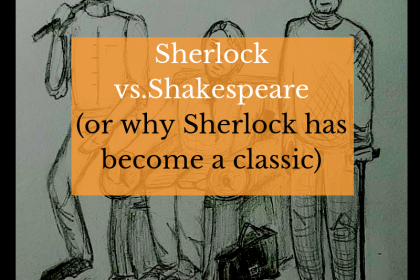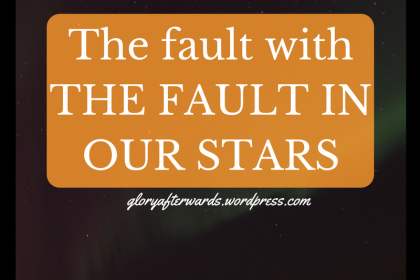| FIRSTLY |
If you signed up to email updates from Gloryafterwards in order to stay in the loop about CALLED TO WATCH – head on over. You can sign up there too to stay in the loop. A new post was published on Monday: “Watching is hard (how do we deal with that?)”
| UPDATE OVER |
I’m aware that most people following this blog are probably not that fascinated by the latest reincarnation of Sir. Arthur Conan Doyle’s famous detective Sherlock Holmes. But I have to admit… I am.
I am absolutely intrigued by how the BBC has managed to bring a 19th century hero into the 21st century – which aspects they have kept, which they have changed. What follows are my thoughts on The Six Thatchers (Season 4, Episode 1). It’s been three years since the last season, and will probably be at least that until the next one, so bear with me?
Even if you have never seen SHERLOCK, thematically the episode is interesting. It asks questions like:
Do all actions have consequences?
What things should you share with your spouse, and which should you tackle alone?
To what extent can you blame someone for a death?
Can the evil in this world be avoided if you try hard enough, love strongly enough? (spoilers: the answer is ‘no’)
What I liked
Sherlock solving cases (and cases, and cases)
In the books he solves cases rapidly and often without leaving his armchair. This is mirrored here in the opening scenes, and culminates in the brilliant moment when he meets Mary at her rendezvous and suggests they head back to “his city”. Like the original Sherlock Holmes, Sherlock displays his masterful genius and, despite all his eccentricities and hilarious naivety, is thoroughly in control of the action (for now).
Sherlock’s narration
Sherlock narrating the “Samarra” parable. Since the Sign of Three (S3, E2), narration (or whose eyes the audience see the events through) has been subtly shifting from John to Sherlock. Yet this episode is the first time Sherlock has blatantly narrated (ie. We’ve been obviously privy to his thoughts, which are intended for us).
It demonstrates a shift in characterisation. Sherlock, once so obsessed with himself, has become a bit more open. Once he believed that he could defy death, control his own destiny. Now, after his own hubris led to the death of one of his best friends, he is questioning whether “Samarra (or predestined death) can be avoided?”
Also, I love it when modern stories reflect on, or use, ancient ones. Makes me so happy.
Guns have consequences
I read this elsewhere, but I really believe it’s true. So many detective TV shows or novels have guns being pulled out and waved around quite frequently, and yet they very often remain unused.
On the contrary, SHERLOCK has quite a track record of gun-deaths (in almost every episode someone either dies, is injured, or is forced to deal with the fall-out from the appearance of a weapon), and so we take their presence seriously (as we would in real life).
The ladies
There is (as there always will be) a lot of criticism regarding the portrayal of female characters in this show. And yet I have very few qualms. This is the first reincarnation of Sherlock Holmes (that I am aware of) which has developed Mary into a character in her own right, not to mention Mrs. Hudson (love, love the Norbury scene in the conclusion, not least of all because it’s a direct quote from canon). Then of course Molly is brilliant, and for once Irene is an adversary before being a love interest (or so I read it).
Mary is so brilliant here, and her demise is truly heartbreaking, not primarily because of the impact it will have on the other characters, but simply because she is so likeable.
We do not soften death
Often when ‘good’ characters die, the actual impact of their death is softened, either by:
- Lots of foreshadowing
- Making it a very, very planned sacrifice with heroic speeches beforehand
- Loosening their grip on the world in the scenes leading up to their death, either by having them become diagnosed with a disease or having relationships fall apart so they practically have no reason to live (did the writers make a weak attempt to do this by showcasing John texting another woman? I reserve my judgment until the next episode).
Perhaps because her death is so inevitable (ie. see the original books), the writers didn’t feel the need to endlessly foreshadow her death in this episode. They did a little (after all, this was an episode about consequences), but at the same time, Mary’s death – in that manner, saving Sherlock, at that time and in that place – was a shock.
And that is how death is.
Sherlock’s fault
Mary’s death appeared inevitable – but was it really? Sherlock will never know, because it was his childish desire to bait the criminal and reveal his cleverness which lead to it. Perhaps Mrs. Norbury would not have tried to shoot him otherwise? This is a heavy burden for him (and John) and something the original character never had to worry about. The writers are leading the show into unknown waters, and that is good and relevant, because as this episode demonstrates, all actions, all attitudes, all choices have consequences, and in this manner, Samarra cannot be avoided.

What I liked less
The positioning of Mary’s death
Let’s get this straight. Mary had to die. It’s in the canon. It was needed for the show to move forward. It was required to take place soon, because we would have all felt gypped if past-assassin Mary settled down and lived a happy life with no consequences. It was, for a large part, inevitable. Once the show runners revealed her history (as they did in this episode) they could only delay her death by inserting filler material, or drag the actual death out longer, thus diverting attention from the main duo and their crimes.
And yet.
Having her die just after discovering her past cheapened the episode. It made it seem as though we discovered her past simply so her death would make sense – ie. ‘using’ her on a plot rather than a character level. It made all the revelations and relationships displayed in The Six Thatchers appear to merely be ‘set-up’ rather than important in their own right.
Not to mention the aftermath of her death was rushed over (although organised so that it nicely mirrored Sherlock’s previous ‘death’) in order to set the scene for the next episode.
Could Norbury have pointed the gun – then episode ended – leaving us time to digest and appreciate Mary’s past for its own merit – and then have her death & aftermath before the credits in episode 2? Just a thought.
Mycroft
Don’t get me wrong! I love the Holmes brothers and their relationship. But in one sense this is what frustrated me. We saw more of them, and they displayed more ‘normal’ emotions, than in any other episode. This was a pleasure, but also a shame. Because I think part of what makes them brilliant characters is the fact that they are slippery characters. They have a past we don’t know about and a relationship we understand. The writers run the risk of making it all a bit too ‘normal’. On that note, would Mycroft really wrestle Sherlock’s phone out of his hand in front of his colleagues? And where on earth is Mycroft’s office that Sherlock is so frequently visiting? It looks like some WWII bunker – cool, but not very realistic?
Miss me?
Mary labelling her posthumous video message “Miss me?” Did she expect to die straight away then? Because “Miss Me?” would only have significance until Sherlock had solved the case of Moriarty’s reappearance.
Sharks?
I liked and understood the continuing motif of ‘sharks’ and ‘predators’, paralleled with the ‘cold’ face of Death in the parable, and collimating in the fateful aquarium scene. Yet I had one hesitation – in His Last Vow (S3E3) the villain is described as a shark (an adaptation from the original story), and so every time one appeared I thought of him, and it was a bit distracting. Surely they could have used a new symbol?
Image courtesy of PBS/Masterpiece
